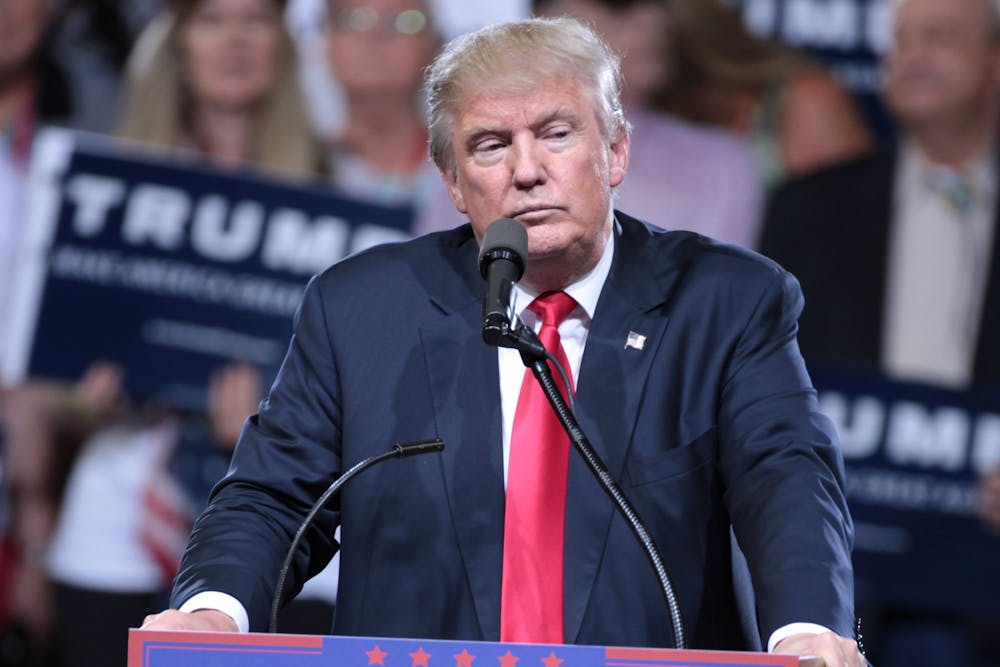Our house is on fire, and President Donald Trump is adding fuel — literally. As a climate change skeptic and carbon lover, our president’s power and money are deeply invested in the fossil fuel industry. Last month, just a couple of years after the Paris Climate Agreement was approved by the vast majority of nations, Trump formally initiated America’s withdrawal. After one year, it will become official. If Trump succeeds in removing the U.S. from the Paris Climate Agreement, our economy and national safety will progressively weaken.
The potential economic damage that could result from withdrawal greatly outweigh that from remaining active in the agreement. America has been entrenched in the fossil fuel arena for a century, as oil and gas have allowed the U.S. to develop immensely and become a top competitor in the global economy. Although fossil fuels put the U.S. on top, we could soon lag behind economically because of these very industries.
Competitors like China could soon take the lead in energy innovation. In fact, the Center for Strategic and International Studies claims that China is “already leading in renewable energy production figures” as it maintains the greatest share of wind and solar production and the largest investment in renewables. The country is rising in the ranks while still fully committed to the Paris Agreement. The UN’s Emission Gap Report last year shared that China is “on track to meeting their NDC targets,” but America’s “GHG emissions trajectories fall short of achieving their unconditional NDCs.”
To make matters worse, the threat of potential trade sanctions looms over the U.S. if Trump succeeds in withdrawing. Nations may exclude the U.S. in some markets to show their dedication to clean energy and dismay of America’s energy corruption. International financial boycotting has been used in the past, and America is not invincible to it.
Nevertheless, apprehension to change is understandable. Many Americans depend on the fossil fuel industry to supply jobs, and it’s been a backbone for many regions across America for well over a century. However, the Paris Climate Agreement does not pose an immediate threat to the people holding these jobs nor to the companies providing them. Since the whole point of the commitment is that each nation is allowed to determine their level of emission contributions, there is no immediate threat of job loss from the deal. Regardless, coal companies all over America are declaring bankruptcy as many components of the industry have become stranded assets.
However, this is not at the hand of regulations. It is because the cost-benefit analysis for fossil fuels versus renewables is shifting, and renewables are winning out. Jobs in the renewable energy sector are growing every day. Entry level positions like solar technicians to high level jobs developing the emissions-free technology exist coast to coast. According to the Bureau of Labor Statistics, the two jobs projected to be the fastest growing in the next decade are solar photovoltaic installers and wind turbine service technicians. If we live up to our expectations of the agreement, we can lead the way in employment opportunities for Americans. Otherwise, countries like China will take these jobs as energy demand growth continues overseas.
Apart from falling short in global economic competition, withdrawal will threaten our safety. The primary role of a government is to protect the wellbeing of its constituents, but many Americans are already feeling the consequences of climate change. Coastlines are disappearing, fiercer storms are costing cities billions of dollars and forest fires are destroying precious land and homes. Hurricane Harvey cost $125 billion, according to the National Oceanic and Atmospheric Administration, and damaged 135,000 homes and 1 million cars. It’s estimated that there will be approximately 250,000 additional deaths per year between 2030 and 2050 due to climate change alone. On a humanitarian level, we simply cannot ignore that people are losing their homes, livelihoods, and loved ones to this crisis. Without climate action, the U.S. will continue to suffer immense losses.
Let's face it — the current Trump administration is too embedded in coal, oil and gas for Trump to replace America's membership with a supposedly smarter climate plan like the one he’s proposed. The Affordable Clean Energy Rule is far from alleviating emission, and may actually increase them. Since it will only regulate individual power plants, providing them with efficiency upgrades, it makes the plants to run cheaper — and thus allowing them to run more often. Plus, the increased efficiency allows the plants to compete better with cleaner alternatives, so it will be price-competitive to emit more.
Having given notice of Trump’s withdrawal last month, official removal from the Paris Climate Agreement would go into effect exactly one year later — one day after the next U.S. presidential election. Ballots in November will determine the fate of America’s standing in the agreement. Dr. Elizabeth Bomberg from the University of Edinburgh affirms that “Trump’s impact will depend less on what he does, and more on what others do.” Americans need to panic, and they need to bring that panic to the ballot box to ensure that climate deniers can no longer make decisions about our future.
Lindsey Stevens is a fourth-year student in the College.







